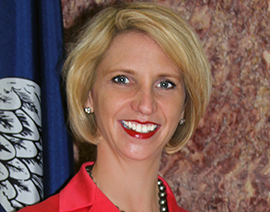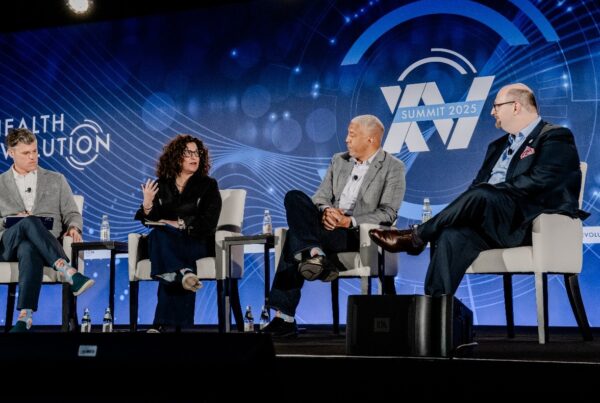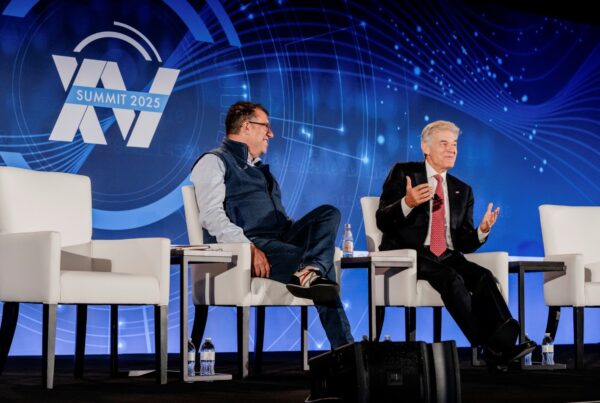The past 12 months, much like the year prior, were incredibly difficult for health care executives and workers, policymakers, tech innovators and, of course, people across the country — and 2021 opened new possibilities for improving conditions.
From working to advance equity to re-imagining primary care to deploying next-generation technologies, bolstering clinical trials and striving to create a more affordable, resilient and equitable health care system, these quotes highlight what happened and offer a glimpse of what’s to come in the years ahead.
The Great Resignation in health care: Five solutions to the problem
“Workforce is the top challenge right now for CEOs. I don’t know if I could start anywhere else at this moment in time than with workforce. All industries are challenged right now, and labor is scarce across the board, but in health care it’s a matter of life and death. Unfortunately, some of the areas that are most strained are emergency rooms, critical care units and areas that saw the most intense utilization and grimmest stories during COVID.” — Brian Tabor, President, Indiana Hospital Association
Managing executives who don’t understand the value of diversity
“When you have 150,000 members of an organization, you’re going to have different points of view represented in the different communities. I conducted discussions for the senior most leadership. It was gut-wrenching. It was revealing. It was hard, but I’m happy to say in many cases it was also transformational in that people realize there is such a thing as racism that is unintentional and that some of the behaviors we began to talk about were institutional even in how care was being delivered.” — Lloyd Dean, President & CEO, CommonSpirit Health
HHS Asst Secretary: LGBTQ+ people are not invisible under the Biden Harris Administration
“Health equity is a significant part of my portfolio as the assistant secretary of health. I am really excited about all the areas I can work in to affect meaningful change…both internally and externally. Already, the HHS Office of Civil Rights has interpreted Section 15.57 of the Affordable Care Act that one cannot discriminate on the basis of sex to include sexual orientation and gender identity. In all aspects of the ACA, we’re working on that interpretation. The previous administration stopped all data measurement of SOGI (sexual orientation and gender identity) questions. That impacts so many things. It’s an attempt to make us invisible. Under President Biden and Vice President Harris, we’re not invisible.” — Rachel Levine, MD
Vaccine mandate puts health care CEOs in a tough spot
“Even before COVID there was a terrible nursing shortage. It’s not just in nursing, but it’s most acute in nursing. The pandemic has made it much worse, and it’s put a lot of pressure on us because of the increased volumes we’ve seen. In the middle of this, putting a mandate on our people where we could lose 5-10 percent of our workforce can exacerbate our shortage. It could hurt people who have COVID and people who don’t have it and delay their access to care because we won’t have enough staff. I understand why the President did it and I agree with the reason…but I don’t think it’s the best policy. You can’t make decisions like this in a vacuum.” — Alan Levine, Executive Chairman, President & CEO, Ballad Health
How Nashville General is addressing inequities
“The U.S. is the only industrialized nation that does not recognize health care as a right. I want to be clear that this is not a knock, it’s a fact. Health care isn’t a right so each area has to fend for itself and create its own policies because a pandemic or epidemic will attack the weakest link. We saw it with AIDS, chronic conditions and now COVID-19. The weakest link are the people and communities in the lower socioeconomic status because they often don’t have policies or infrastructure that guarantees access. What we have to do then in our communications with populations in that socioeconomic status that cannot afford care is mitigate the effects.” — Joseph Webb, CEO, Nashville General
Jonathan Bush on founding Zus Health, lessons from athenahealth and hospital cafeteria food
“Looking back, I spent a hilarious amount of time getting the setting right for working on this complicated, single monolithic project. It was fun, but it was not modern. The pandemic cleaned up that thinking for people. We all instantly, with no warning, had to work 100 percent remotely for a while. It cleaned out a lot in-person waste. Zus is extremely containerized. There are three products, each product doesn’t even need to use the other products to function. The code is containerized. I require people to meet once every month with someone and every other month as a team.” — Jonathan Bush, CEO, Zus Health
Clinical research 2.0: An interview with Verily Life Sciences Amy Abernethy
“Something that I don’t think gets enough discussion is improving study design. We saw during the pandemic, for example, the use of platform trials like a live recovery trial in the UK to test multiple interventions simultaneously. These are not brand-new trial designs, we’ve been talking about them for a decade or more, but they’re complex to put in place and we should be using software and data to reduce the complexity. We should be trying to understand how to overcome some of the cultural and contractual types of errors. We need to do be smarter about study design and we should be much smarter about things like eligibility criteria and the use of biomarkers.” — Amy Abernethy, MD, President, Verily’s Clinical Studies Platform
Digital health strategy for CEOs: Core elements to focus on
“It’s clear that a digital revolution is happening across our industry and while we may have been slow to the digital parade, we are making up for lost time,” said Nancy Agee, President & CEO, Carilion Clinic. “The CEO must be engaged such that digital health transformation is a priority. This work can’t be put off to the side of someone’s desk. Meaningful digital transformation hinges on leadership and governance as well as competitive positioning.” — Nancy Agee, CEO, Carilion Clinic
Is the concept of social determinants of health inhibiting progress toward health equity?
“I think our industry has created a wonderful excuse for lower performance in certain groups by saying, ‘well, it’s the social determinants of health.’ We have to call social determinants of health what it is — poverty and racism — and speak in plain English as opposed to creating these terms of art.” —Sachin Jain, MD, President & CEO, SCAN Group and Health Plan
Glen Tullman on emulating Apple, the wakeup call Haven should have been and life after Livongo
“We’re not a navigator. We’re not a telehealth company. I think of us like Apple. Apple designed an experience and that’s what we’re doing here. We are going to create an absolutely different kind of experience that puts the consumer in charge of their health and care and do so by adhering to the principles that have worked with every other consumer industry.” — Glen Tullman, CEO, Transcarent
The future of primary care? Considerable change coming in 3 years
“The question is what needs to happen as we are looking to address a new paradigm of primary care? What should be offered and where should it be offered? How do we drive adoption and create continuity across options? How do we as leaders build seamless solutions? What are the federal solutions to this? The answers to these questions will be the runway on which we land the plane of primary care for the future.” — Rebekah Gee, MD, CEO of Health Care Services for LSU Health











